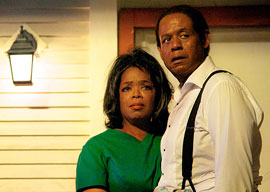
August 21, 2013

Oprah Winfrey and Forest Whitaker
As a young man, he breaks into a restaurant and eats all the desserts. Out of racial solidarity, the black manager hires him on the spot. As absurd as Django Unchained was, Tarantino grasped the psychology of Samuel L. Jackson’s boss slave much better than does screenwriter Strong, who is almost wholly lacking in anything to say about class tensions among blacks. As a white man, Strong can’t suggest that middle-class blacks had any reason to shun blacks’ lumpenprole ways, so everything must revolve around white racism.
The White House scenes consist of the butler serving coffee and looking on weepily while civil-rights policy is discussed by various presidents (played by celebrities so improbably cast”such as Robin Williams as Dwight Eisenhower”that Jane Fonda as a gracious Nancy Reagan is the high point of verisimilitude).
The film’s central point is that the butler wasn’t encouraged to offer presidents his political opinions, which drives his wholly invented radical son crazy. But Martin Luther King is brought onstage moments before his assassination to facilitate an eventual father-son reunion by explaining that black domestics were an obsolete but necessary step in the historical evolution of that highest form of life, black political activists.
The Butler‘s screenplay is too dumbed down and butched up to be in Daniels’s wheelhouse. It’s easy to imagine how Daniels got interested in the story”all those fabulous place settings!”but there’s no time left over after the civil-rights lectures for any of the fascinating details about how a great house works that were highlights of the English butler movie The Remains of the Day. (The director briefly perks up when the son becomes a Black Panther in black leather and his girlfriend grows out a stunning beach ball-sized Afro à la Angela Davis, but The Butler is weaker on historical fashion’s pleasures than most movies.)
An obvious tell that the prosaic Strong rather than the flaming Daniels has a chokehold on the film is the Forrest Gump-like devotion to the butler’s relationship with the presidents rather than with the first ladies. We see five of the former but only two of the latter, even though first ladies ultimately manage the White House’s domestic side. Moreover, the movie’s female core audience and very gay director tend to be more interested in the wives. Remember the enormous 1981 spat over Nancy Reagan ordering $210,000 worth of china for state dinners? The White House’s considerable glamour is dependent upon its mistresses.
Some of the made-up parts aren’t bad. Allen’s wife of 65 years was by all accounts a highly respectable church lady, but Oprah Winfrey wasn’t going to allow her return to movie acting after 15 years be a snooze. So Oprah plays Mrs. Allen as a bored housewife with weaknesses for hard liquor and silver-tongued layabouts (such as a better than usual Terrence Howard).
Oprah is terrific, by far the most entertaining aspect of The Butler. In fact, the billionairess’ lines are so superior to the rest of the cast’s that I wouldn’t be surprised if she kept her own team of script doctors on retainer.
Oprah earned an Oscar nomination way back in 1985 for The Color Purple but soon developed the discipline to walk away from movie stardom’s siren song to concentrate on media properties she could own, much to her financial advantage.
On the other hand, Forest Whitaker, a distinguished character actor who won the Best Actor Oscar playing Idi Amin in The Last King of Scotland, is miscast as the titular butler.
As British works from P. G. Wodehouse’s Jeeves stories to Downton Abbey have taught us, head butlers are the class system’s sergeant majors. They are imposing presences who, from behind their professional masks, can convey their opinions (generally disapproving) with a single well-chosen word or a raised eyebrow.
The gentle giant Forest Whitaker, on the other hand, usually looks like he’s suffering from gastrointestinal distress as he undulates uncomfortably. And a distracting hereditary flaw with his left eye makes him seem always on the verge of tears. Whitaker’s secret-sorrow shtick can be astonishing in small doses, such as in his cameos in The Color of Money and The Crying Game, but he doesn’t wear well over a long movie. It’s hard to imagine all those presidents tolerating their butler’s incessant Oscar-baiting.